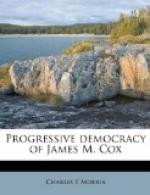During all the progress of the early part of the campaign the Governor denounced those who “are seeking to set up racial lines and create a prejudice among the foreign elements in our midst.” He said: “While other powers are doing everything possible to hold the loose ends of civilization together, these leaders are deliberately conspiring to mislead the great bulk of Americans with assertions that are, when analyzed, nothing more than demagoguery of the crudest kind.” Earlier in the year, in speaking before the Jefferson Club of Marion, Indiana, the Governor said: “The plot to multiply the woes of mankind, in order that confusion multiplied might be charged to President Wilson’s insistence on principle and international good faith, is now passing through the process of public thought, and we have confidence in an intelligent verdict. The winning of the war, in less time than the formalizing of peace carries a contrast that needs no comment.”
During the period for the selection of delegates to the Democratic Convention at San Francisco, Governor Cox gave a signed interview to the New York Times, in which he reviewed the controversy concerning the League of Nations and outlined two reservations which he believed would satisfy every reasonable objection. In part, he said:
“If public opinion in the country is the same as it is in Ohio, then there can be no doubt but that the people want a League of Nations because it seems to offer the surest guarantee against war. I am convinced that the San Francisco Convention will endorse in its vital principles the League adopted at Versailles.
“There can be no doubt but that some senators have been conscientious in their desire to clarify the provisions of the treaty. Two things apparently have disturbed them. First, they wanted to make sure that the League was not to be an alliance, and that its basic purpose was peace and not controversy. Second, they wanted the other powers signing the instrument to understand our constitutional limitations beyond which the treaty-making power cannot go.
“Dealing with these two questions in order, it has always seemed to me that the interpretation of the function of the League might have been stated in these words:
“’In giving its assent to this treaty, the Senate has in mind the fact that the League of Nations which it embodies was devised for the sole purpose of maintaining peace and comity among the nations of the earth and preventing the recurrence of such destructive conflicts as that through which the world has just passed. The co-operation of the United States with the League and its continuance as a member thereof, will naturally depend upon the adherence of the League to that fundamental purpose.’
“Such a declaration would at least express the view of the United States and justify the course which our nation would unquestionably follow if the basic purpose of the League were at any time distorted. It would also appear to be a simple matter to provide against any misunderstanding in the future and at the same time to meet the objections of those who believe that we might be inviting a controversy over our constitutional rights, by making a senatorial addition on words something like these:




